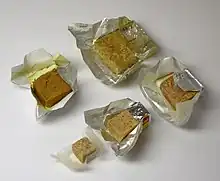magi
English
Pronunciation
- IPA(key): /mæd͡ʒaɪ/, /ˈmeɪd͡ʒaɪ/, /ˈmeɪɡaɪ/
- Rhymes: -eɪdʒaɪ, -eɪɡaɪ
Anagrams
Danish
Declension
Declension of magi
| common gender |
Singular | |
|---|---|---|
| indefinite | definite | |
| nominative | magi | magien |
| genitive | magis | magiens |
Synonyms
trolddom, trylleri
Related terms
magiker, magisk
Faroese
Etymology
From Old Norse magi, from Proto-Germanic *magô.
Pronunciation
- IPA(key): /ˈmɛaːjɪ/
- Rhymes: -ɛaːjɪ
Gothic
Icelandic
Etymology
From Old Norse magi, from Proto-Germanic *magô.
Pronunciation
- IPA(key): /ˈmaijɪ/
Indonesian
Etymology
From Dutch magie, from French magie, from Middle French magie, from Latin magīa, from Ancient Greek μαγεία (mageía).
Pronunciation
- IPA(key): [ˈmaɡi]
- Hyphenation: ma‧gi
Noun
magi (plural magi-magi, first-person possessive magiku, second-person possessive magimu, third-person possessive maginya)
Compounds
- magi hitam
- magi putih
Further reading
- “magi” in Kamus Besar Bahasa Indonesia, Jakarta: Language Development and Fostering Agency — Ministry of Education, Culture, Research, and Technology of the Republic Indonesia, 2016.
Italian
Pronunciation
- IPA(key): /ˈma.d͡ʒi/
- Rhymes: -adʒi
- Hyphenation: mà‧gi
Latin
References
- “magi”, in Geir T. Zoëga (1910) A Concise Dictionary of Old Icelandic, Oxford: Clarendon Press
- “magi”, in The Perseus Project (1999) Perseus Encyclopedia
- “magi”, in Harry Thurston Peck, editor (1898) Harper's Dictionary of Classical Antiquities, New York: Harper & Brothers
- “magi”, in William Smith, editor (1854, 1857) A Dictionary of Greek and Roman Geography, volume 1 & 2, London: Walton and Maberly
Norwegian Bokmål
Etymology
From Ancient Greek μαγεία (mageía), from μάγος (mágos).
Derived terms
Related terms
References
- “magi” in The Bokmål Dictionary.
Norwegian Nynorsk
Etymology
From Ancient Greek μαγεία (mageía), from μάγος (mágos).
Derived terms
Related terms
References
- “magi” in The Nynorsk Dictionary.
Old Norse
Etymology
From Proto-Germanic *magô. Compare Old English and Old Frisian maga, Old Saxon and Old High German mago.
Declension
Descendants
References
- “magi”, in Geir T. Zoëga (1910) A Concise Dictionary of Old Icelandic, Oxford: Clarendon Press
- “magi”, in The Perseus Project (1999) Perseus Encyclopedia
- “magi”, in Harry Thurston Peck, editor (1898) Harper's Dictionary of Classical Antiquities, New York: Harper & Brothers
- “magi”, in William Smith, editor (1854, 1857) A Dictionary of Greek and Roman Geography, volume 1 & 2, London: Walton and Maberly
Romanian
Swedish
Declension
| Declension of magi | ||||
|---|---|---|---|---|
| Singular | Plural | |||
| Indefinite | Definite | Indefinite | Definite | |
| Nominative | magi | magin | magier | magierna |
| Genitive | magis | magins | magiers | magiernas |
See also
References
Yoruba

Magí.
Alternative forms
- mojí (Èkìtì)
Etymology
From English Maggi, which was genericized from the name of the company and product, named after Swiss entrepreneur Julius Maggi.
Pronunciation
- IPA(key): /mā.ɡí/
Noun
magí
- (genericized trademark) bouillon cube; stock cube (regardless of brand)
- 2014-7-12, @bodex4mama, Twitter :https://twitter.com/bodex4mama/status/488057808089534464
- sugbon ao le se'be ka ma fi magi si lode oni. Bi a ba tie fi iru si, ao tun fi magi die si tori oun na ni awon eroja asara loore (ṣùgbọ́n a ò lè sebẹ̀ ká má fi magí sí lóde òní. Bí a bá tiẹ̀ fi irú sí, a ó tún fi magí díẹ̀ sí torí òun náà ní àwọn èròjà aṣaralóore)
- But we can't cook stew without adding stock cubes nowadays. Even if we use iru [locust beans], we'll still add some of stock cubes because it has nutrients too.
- sugbon ao le se'be ka ma fi magi si lode oni. Bi a ba tie fi iru si, ao tun fi magi die si tori oun na ni awon eroja asara loore (ṣùgbọ́n a ò lè sebẹ̀ ká má fi magí sí lóde òní. Bí a bá tiẹ̀ fi irú sí, a ó tún fi magí díẹ̀ sí torí òun náà ní àwọn èròjà aṣaralóore)
This article is issued from Wiktionary. The text is licensed under Creative Commons - Attribution - Sharealike. Additional terms may apply for the media files.